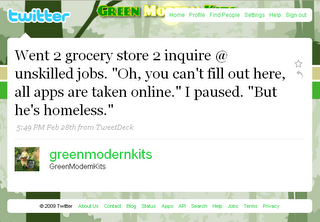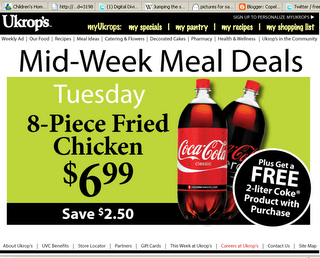Musings and laughter at the Richmond web / media agency copeland casati media C3.
Links
Archives
- January 2009
- February 2009
- March 2009
- April 2009
- June 2009
- July 2009
- August 2009
- September 2009
- October 2009
- November 2009
- December 2009
- January 2010
- February 2010
- March 2010
- April 2010
- June 2010
- August 2010
- September 2010
- October 2010
- November 2010
- December 2010
- January 2011
- February 2011
- March 2011
- April 2011
- June 2011
- July 2011
- September 2011
- January 2012
- September 2012
- February 2013
- April 2013
- July 2013
- August 2013
- January 2014
- March 2014
- April 2014
3/3/09
Digital Divide

This week has been full of discussion on the Digital Divide.
It started with a conversation on rural areas and their lack of access to high speed internet, thus removing them from online experiences that might benefit their region economically and educationally. Without good access to the internet, how can their rural voices be heard? Appreciated? Exposed to opportunity? Foster relationships with those outside of their area to then attract tourism? Computers, high speed internet, and a grasp of social media is key to helping small, rural businesses be heard.
Then Eric stopped by.
Eric only comes by when it is about to rain, and asks to clean the gutters so he can afford a room for the night.
We usually don't talk that much, but this time he said, "I'm sorry I keep coming back. I went through the Salvation Army program, but once you're done they kick you out. I really do want to get a job."
I decided I would try to do something about that. I know Eric rests his head *somewhere* nearby, so before hitting up friends that own restaurants downtown to see if they'd hire him I thought I'd look over to the grocery store in our own mutual back yard, Ukrop's.
I felt that by adding bus fare, distance, and transportation hurtles to Eric's existing challenges to work, it would increase his likelihood to not succeed.
 In the shopping center, blocks away, was Ukrop's Grocery Store. I went in and asked for an application. "Oh, we don't take applications, all of our jobs are online!"
In the shopping center, blocks away, was Ukrop's Grocery Store. I went in and asked for an application. "Oh, we don't take applications, all of our jobs are online!"That's when I decided to explore the trend of businesses moving their job opportunities online, and how it would affect those with less resources. I am an environmentally conscious business who encourages people to go as paperless as possible. My job is efficiency.
But is the move to online job submissions encouraging the digital divide?
It reminded me that online access affects urban poor, those unable to purchase computers everywhere, reinforced by this Washington Post story about one unemployed mother who relies on library access to help her child with his homework and searching for jobs.
Anticipated aid could include adding more computers to libraries.
But,this same week, it was pointed out that public computers in libraries, hotels, etc. are rife with security risk, easily hacked or rigged to parlay sensitive information to malicious thieves. (See much more here.)
Thinking about the digital divide and its implications, a new thread emerges, and brings us back to:
Brand.
Ukrop's may not be on twitter yet, but they exemplify social.
When the online job application quandary appeared, the customer service rep paused and hand wrote a number on paper, "Try this number to call."
 I called, and explained to Ukrop's employee #2 Eric's plight of applying online as he is homeless and without easy transportation to a library. She listened to me and did not try to fire off corporate HR dogma or cut me short. Then she said, "I'm going to find the appropriate person and get them to call you."
I called, and explained to Ukrop's employee #2 Eric's plight of applying online as he is homeless and without easy transportation to a library. She listened to me and did not try to fire off corporate HR dogma or cut me short. Then she said, "I'm going to find the appropriate person and get them to call you."Employee #3 did call.
Three employees did not drop balls and instead passed the issue higher.
Matt Riley not only listened, did not discourage me, but engaged me in many of the aspects above- discussed the dilemma of job applicant functionality and environmental-impact of encouraging paperless applications being relevant when one considers that some applicants may not have access to online, and said they would consider and discuss having a small number of paper applications available in stores for those in that situation. (My suggestion: maybe have them online but "to print" function so Ukrop's employees could print them in-house, on an "as needed" basis?)
This is social, the way people have engaged for eons before the invention of the term "social media": Listening, engaging, reaching out, communicating with your current and potential customers, and addressing issues whether they are a customer or not, because you care.
Contrast user experience with the sites I visited looking for information on homeless services today: static, and on a snowy dangerous day, after going through their poor navigation to find contact information: no one returned my call.
Ironically, these people need most to understand social technology tools, to best provide their outreach to those most affected by the divide.
Ukrop's employees not only communicated well, they refused to pass off a difficult question; each of them took it a step further than their job description: by the end of my call with Mr. Riley, he not only provided me with his direct phone number so that, despite the economy and hiring freezes, when Eric stops by next, he will have a real person to go see that can take his application, but with phone numbers to other organizations that could help I had not yet discovered.
Labels: digital divide, social media, trends

